#Diyu
Explore tagged Tumblr posts
Text
A Guide to the Chinese Underworld (and what it isn't)
As many FSYY and fox posts as there were on my blog, I am actually a huge fan of the Chinese Underworld mythos. Mostly because I was once a morbid little kid that loved reading about the excavations of ancient tombs, and found the statues depicting hellish torture in the Haw Par Villa "super cool".
Apart from the aesthetics, the history of its evolution is also fascinating. Most of us, Chinese or not, only know the most popular version of the Underworld——the "Ten Kings" system, yet that isn't always the case. So today, I'll start off with a short summary of that.
In pre-Qin era, there was already this generic idea of a "Realm of the Dead" called the Yellow Spring, Youdu, or Youming, but we know very little about it.
Then, in the Han dynasty, two ideas start to emerge: 1) the Underworld is a bureaucracy, 2) the God of Mt. Tai ruled over the dead.
This early bureaucracy might not function as an agent of punishment; the main focus was on keeping the dead segregated from the living so they wouldn't bring diseases and misfortune to the latter, as well as using those ghosts to enforce collective punishments upon people for their lineage's wrongdoings while they were still alive.
Post-Han, after Buddhism entered China and took root, its idea of karmic punishments and reincarnation and the figure of King Yama was merged with folk and Daoist ideas of the Underworld bureaucracy, and, came Tang dynasty, resulted in the "Ten Kings" system that first appeared in Dunhuang manuscripts.
It was very rudimentary and far from well-established, as seen in Tang legends, with some adopting the Ten Kings system, some sticking to the Lord of Mt. Tai and some favoring King Yama, and overall little agreements on who's in charge of the Underworld.
But the "Ten Kings" system would become the mainstream version from then onwards, used in Ming vernacular novels and made even more popular by folk religion scrolls like the Jade Records (Yuli Baochao).
As such, most points in the following sections will be based on the fully matured "Ten Kings" system of the Underworld, as seen in the Jade Records and JTTW.
What happens when you die?
(This is a fictionalized walkthrough of the posthumous fate of souls under the "Ten Kings" system. I try to stick to the very broad progression outlined in the Jade Records, but many creative liberties are taken on the details.)
Let's say there's a guy named Xiao Ming, and he had just died of a heart attack. Bummers. What now?
Well, the first thing he saw would be the ghost cops.
There isn't really an unanimous agreement on who these ghost cops are: they may be a pair of ghosts in white and black robes, wearing tall hats (Heibai Wuchang), they may have the heads of farm animals (Ox-Head and Horse-Face), or they can just be generic ghost bureaucrats. For convenience's sake, let's say it was the first scenario.
"Who are you guys and where are you taking me?"
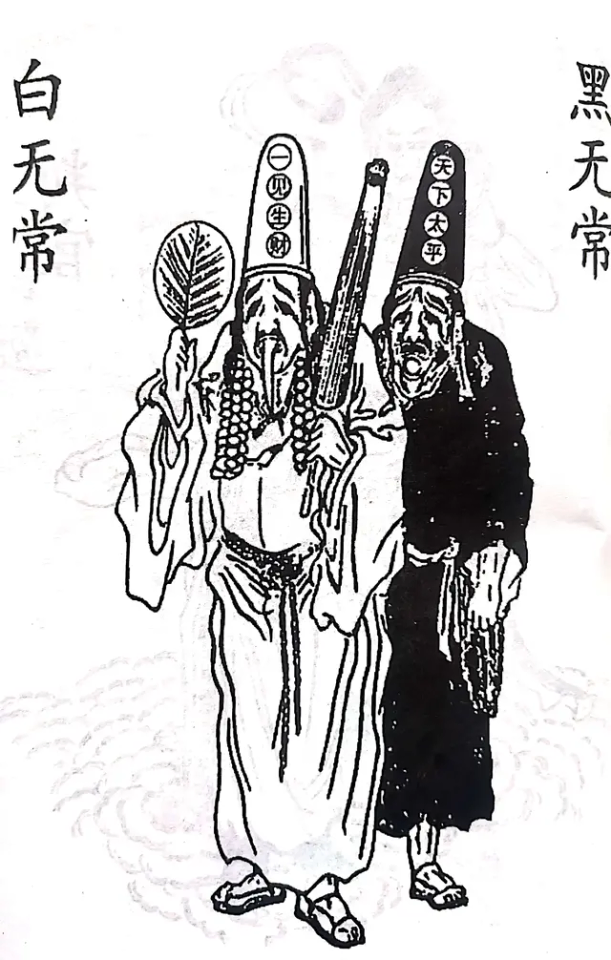
"Glad you asked!" The taller ghost cop, being the cheerful one of the pair, replied. It wasn't very reassuring, considering that his tongue was dangling out of his mouth way further than it should. "I'm the White Impermanence, my sour-looking colleague here is the Black Impermanence, and we are taking you to the City God's office."
This City God, a.k.a. Chenghuang, is just like how it sounds: the divine guardian of a city, who also pulls double duty as the head of the local Dead People Customs Office. They are usually virtuous officials deified posthumously, and in JTTW, they fall under the category of "Ghostly immortals", together with the Earth Gods a.k.a. Tudi.
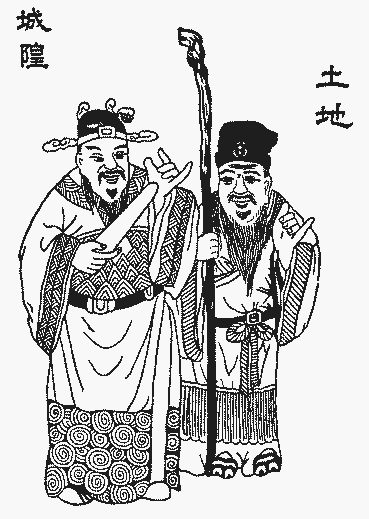
So Xiao Ming went with the two ghost cops——not like he had much of a choice, made his way through the long queue at the City God's office, and was now standing in front of a gruff old magistrate in traditional robes.
"Name?"
"Wang Xiao Ming."
"Age and birth dates?"
"21, April 16 2003…"
After he was done asking questions, the City God flipped through his ledger, then picked up a brush, ticked off Xiao Ming's name, and told him to go get his pass in the next room. More waiting in a queue. Wonderful.
"I never heard anything about needing a pass to get to the Underworld," the girl in front of Xiao Ming asked the ghost cops, who were standing guard nearby. "Is this a new policy or something?"
"Yeah. In the old days, we'd just drag y'all straight to the Ghost Gate." The ghost cop in black said, then muttered to himself, "Fuckin' paperworks and overpopulation, man…"
(This "Dead People Passport" thing was popularized in the middle-to-late Ming dynasty, as shown by the discovery of such documents inside tombs in southern China. )
(It might have evolved from similar passes to the Western Pure Land in lay Buddhism that recorded their acts of merits. Which, in turn, might be traced back to the "Dead People Belongings List" of Han dynasty, to be shown to Underworld bureaucrats so that no one would take away the dead's private property down there or something.)
Anyways, after he received his pass, Xiao Ming departed together with the rest of the bunch, to be led to the Ghost Gate. It was like the world's most depressing tourist group, where instead of tour guides, you got two ghost cops in funny hats, and the only scenery in sight was the desolation of the Yellow Spring Road.
They weren't the only travellers on the road, though. Xiao Ming noticed other groups moving in the far distance, behind the fog and the flickering ghostfire, led by similar figures in black and white.
It made a lot of sense; realistically, there was no way two ghost cops could fetch hundreds of thousands of dead people all by themselves.
(SEA Tang-ki mediums believed there were multiple Tua Di Ya Peks——Hokkien name for the Black and White Impermanences, working for different Underworld Courts.)
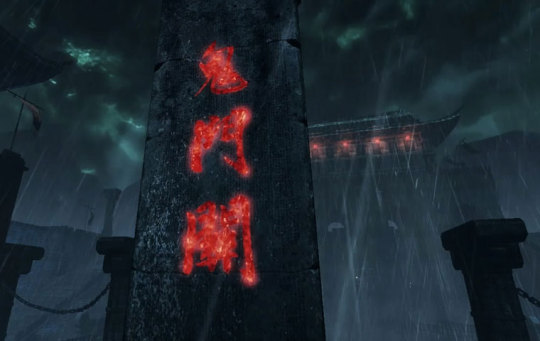
At last, the Ghost Gate stood in front of Xiao Ming, guarded by two towering figures. Normally, they'd be Ox-Head and Horse-Face, like what you see at Haw Par Villa's Underworld entrance.
However, older Han dynasty works like Wang Chong's 论衡·订鬼 also mentioned two gods, Shenshu and Yulei, as guardians of the Ghost Gate, who would use reed ropes to capture malicious ghosts and feed them to tigers, making them possibly the earliest incarnation of "Gate Gods".
So here, they were what Xiao Ming sees, standing side by side like proper doormen, silently watching herds of ghosts being funneled through the entrance.
The place was more crowded than a train station during the CNY Spring Rush; the ghost cops had already said their quick goodbye and left to fetch the next group of dead people, leaving the resident officials of the Underworld proper to maintain order and quell any would-be riots.
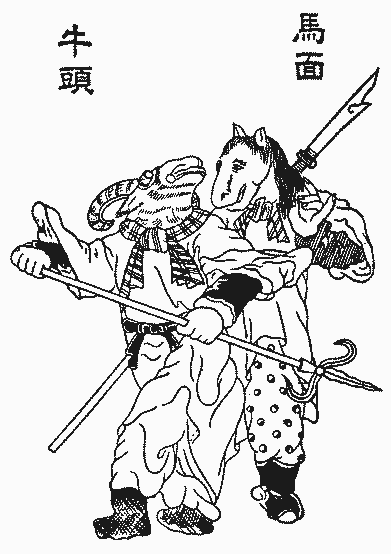
Now you started seeing the Ox-Head and Horse-Face guys, poking at unruly ghosts with their pitchforks and dragging away the violent ones in chains. Among their ranks were other monstrous beings, blue-faced yakshas and imps, but also regular dead humans who look 100% done with their jobs, like the lady who stamped Xiao Ming's pass when it was finally his turn.
After this point, Xiao Ming had entered the Underworld proper, and his next destination would be the First Court, led by King Qin'guang. Here, his fate should be decided by what is revealed in the King's magical mirror.
If Xiao Ming was a good guy, or someone who had done an equal amount of good and bad things in life, he'd be sent straight to the Tenth Court for reincarnation. However, if the mirror, while replaying his life events, had displayed more evil deeds than good ones, he'd be sent to one of the 2nd-9th Courts for judgment and then punished inside the Eighteen Hells.
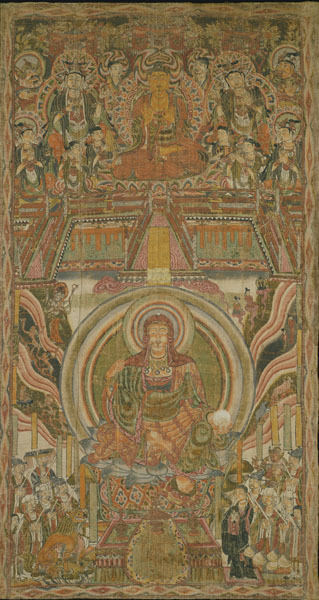
Each of the Ten Kings was also assisted by ghostly judges. Many of them were righteous and just officials in life who had been recruited into the Ten Courts posthumously——Cui Jue from JTTW is one such example, while others were living people working part-time for the Underworld, like how Wei Zheng, Taizong's minister, works part-time for the Celestial Bureaucracy in JTTW.
We decide to be nice to Xiao Ming, so, after reliving some embarrassing childhood incidents and cringy teenage phases in front of a bunch of dead bureaucrats, he was found innocent and sent to the Tenth Court.
The queue here was almost as long as the First Court's, stretching on and on alongside of the banks of the Nai River. King of the Turning Wheel made his judgment without even lifting his head when it was Xiao Ming's turn:
"Path of Humans, male, healthy in body and mind, ordinary family. Next!"
Exiting the Tenth Court building, Xiao Ming saw the Terrace of Forgetfulness, standing tall before six bridges, made of gold, silver, jade, stone, wood, and…some unidentified material. Before he could get a good look at them and the little dots moving across those bridges, he was hurried into the Terrace by the ghostly officials.
Now, both JTTW and the Jade Records mention multiple bridges across the Nai River. In the former, there is 3, and the latter, 6. The bridges made of precious materials are for people who will reincarnate into better lives, as the wealthy, the fortunate, and the divine, while the Naihe Bridge is either the common option or the terribad shitty option.
However, the Naihe Bridge proved to be so iconic, it became THE bridge you walk across to reincarnate in popular legends.
Anyways, back to Xiao Ming. He found himself standing in a giant soup kitchen of sorts, with an old lady at the counter, scooping soup out of her steaming pot and into one cup after another.
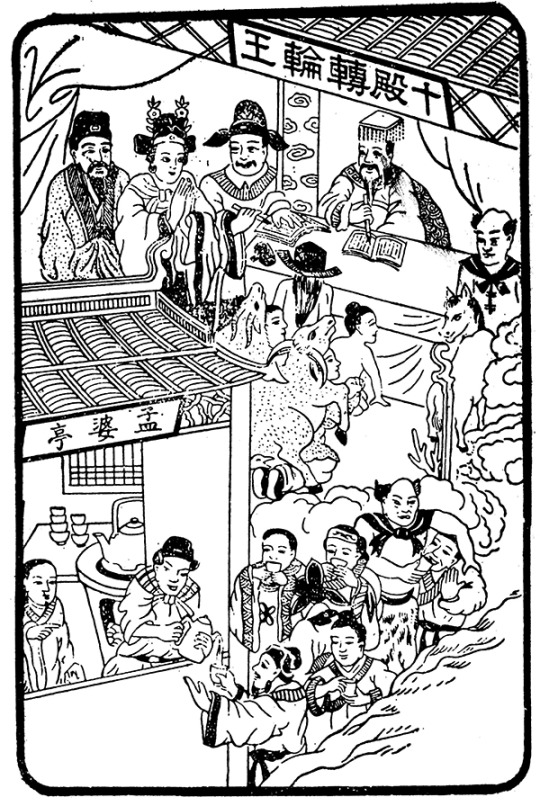
This is Mengpo, the amnesia soup granny; according to the Jade Records, she was born in the Western Han era, and a pious cultivator who thought of neither the past nor the future, only knowing that her surname was Meng.
Made into an Underworld god by the Jade Emperor, she cooks a soup of five flavors that will wipe the memory of the dead, making sure they do not remember any of their past lives once they reincarnate.
It tastes awful. Like what you get after pouring corn syrup, coffee, chilli sauce, lemon juice and seawater into the same cup.
Such was Xiao Ming's last thought, as he gulped down the soup, and then he knew no more.
Things you should know about the Chinese Underworld:
1. It's not the Christian Hell.
Rather, the Chinese Underworld functions somewhat like the Purgatory, in that there are a lot of torment, but the torment's not eternal, however long the duration may be. Once you finish your sentence, you get reincarnated as something else, though that "something else" is not a guaranteed good birth.
Other people can also speed up the process via transferring of merits: hiring a priest/monk to chant sutras and perform rituals, for example, or performing good deeds in life in dedication to the dead, or they can pray to a Daoist/Buddhist deity to save their loved ones from a dreadful fate.
Interestingly enough, a thesis paper I read mentions that, whereas Buddhist salvation from the Hells was based on transference of merits——you give monks offerings and pay them to chant sutras, so they can cancel out the sinners' bad karma with good ones, Daoist ideas of salvation tend to involve the priest going down there, sorting it out with the Underworld officials, and taking the dead out of the Hells themselves.
(The paper also stops at the Northern-Southern and Tang dynasties, so the above is likely period-specific.)
2. Nor is it run by evil demons.
Underworld officials are not nice guys and look pretty monstrous and torture the sinful dead, but they are not the embodiment of evil. Rather, the faction as a whole is what I'd call Lawful Neutral, who function on this "An Eye for An Eye" logic, where every harm the sinner caused in life must be returned to them, in order for their karmic debts to be cleansed and move on to their next life.
They can absolutely be corrupt and incompetent and take bribes——Tang dynasty Zhiguai tales and Qing folklore compendiums featured plenty of such cases, but that's a very mundane and human kind of evil, not a cosmic/innate one.
This is just my personal opinion, but if you want to do an "evil" Chinese Underworld? It should be a very bureaucratic evil, whose leaders are bootlickers to the higher-ups, slavedrivers to their rank-and-file workers, and bullies who abuse their power over regular dead people.
Not, y'know, Satan and his infernal legions or conspiring Cthulu cultists.
3. The Ten Kings are not Hades.
Make no mistake, they still have a lot of power over your average dead mortal. But in the grand scheme of things? They are the backwater department of the pantheon, who only show up in JTTW to get pushed around and revive the occasional dead people.
When Taizong made his trip to the Underworld, the Ten Kings greeted him as equals——kings of ghosts to the king of the living. If they see themselves as equal in status to a mortal emperor, then, like any mortal emperors, they are subordinate to the Celestial Host, and the balance of power is not even remotely equal or in their favor.
Also, it isn't said outright, but under the Zhong-Lv classification of immortals JTTW is using, Underworld officials will likely be considered Ghostly immortals, the lowest and weakest of the five types, much like Tudis and Chenghuangs.
Essentially: they are ghosts that are powerful enough to not reincarnate and linger on and on, spirits of pure Yin as opposed to true immortals, who are beings of pure Yang.
It's pretty much the shittiest form of immortality, the result you get when you try to speedrun cultivation (the Zhong-Lv text also made a dig at Buddhist meditation here), and if they don't reincarnate or regain a physical body, there is no chance of progressing any further.
Oh, and fun fact? In the Song dynasty, commoners and literati elites alike believed that virtuous officials in life would get appointed as ghostly officials in death.
However, the latter viewed it as a punishment. Which was strange, considering how they still held the same position and the same amount of authority, just over dead people instead of living ones, so there should be no big losses, right?
Well...it was precisely the "dead people" part that made it a punishment. See, a lot of the power and prestige they had as officials came from the benefits they could bring to their families and kins and native places, as well as the potential wealth and reputation bonuses for themselves.
A job in the Dead People Supreme Court would give them the same workload, but with none of those benefits. Since all the dead people had to reincarnate eventually, they couldn't have a fixed group as their power base, or keep their old familial ties and connections. At most, they could help out an occasional dead relative or two.
Like, working for the Underworld Courts was the kind of deadend (no pun intended) job not even living officials wanted for themselves in the afterlife. That's how hilariously sad and pathetic they are.
4. In JTTW at least, they aren't even the highest authorities of the Underworld.
That would be Bodhisattva Ksitigarbha, who is technically their boss, though he seems to be more of a spiritual leader than someone who is actually involved in running the bureaucracy.
Which makes sense, since he has sworn an oath to not attain Buddhahood until all Hells are empty, and his role is to offer relief and salvation to the suffering souls, not judging and punishing them.
Now, historically...even though Ksitigarbha in early Tang legends was still the savior of the dead, he seemed to be unable to interfere with the judicial process of the Underworld, merely showing up to take people away before they were judged by King Yama.
However, in the mid-Tang apocryphal "Sutra of Bodhisattva Ksitigarbha" (地藏菩萨经), he had evolved into the equal of King Yama, with the power of supervision over his judgements. By the time the Scripture on the Ten Kings came out, in artistic depictions, the Ten Kings had become fully subservient to him.
5. Diyu usually refers to the prison-torture chamber part, not the courthouse, nor is it the entirety of the Underworld.
And for the majority of souls that haven't committed crimes, they'll only see the courthouse part before they are sent to reincarnation. That's why I personally don't like, or use the name Diyu for the Chinese Underworld: I prefer the term Difu ("Earth Mansions"), which encompasses the whole realm better.
Also: even though historical sources like the Scripture on the Ten Kings and Jade Records seem to suggest that the dead were just funneled through this Courthouse-Prison-Reincarnation pipeline with no breaks in between, in practice, that isn't the case.
According to popular folk beliefs, after the dead were done with their trials/sentences, they stayed in the Underworld for a period of time and led regular lives, while functioning as ancestor spirits and receiving offerings.
Which would imply that the Underworld had a civilian district of sorts, populated by regular ghosts, making the whole realm even less of a direct Hell/Purgatory equivalent.
6. It is located in a different realm, but still part of the Six Paths and doesn't exist outside of reality.
In Buddhist cosmology, like the Celestial Realm, the Underworld is part of the Realm of Desires and thus subject to all the woes of samsara.
The pain and misery of the Path of Hell may be the worst and most obvious, but becoming a celestial being isn't the goal of serious Buddhists either: despite all the pleasures and near-infinite lifespan they enjoy, they are not free from samsara and will eventually have to reincarnate.
So if, say, the world is being destroyed at the end of a kalpa, all beings of the Six Paths will perish alongside it, leaving behind a clean slate for the cycle to start anew. The dead won't all end up in the Underworld and face eternal damnation.
7. The Black and White Impermanences would not appear in the Underworld pantheon formally until the Qing dynasty.
The concept that when you die, you get fetched to the Underworld by petty ghost bureaucrats is already well-established in Tang legends, but these were just generic ghost bureaucrats in all sorts of colorful official robes, with yellow being the most common color.
The idea of there being two specific psychopomps in black and white would only become popular in the Qing dynasty. Mengpo is kinda similar: although she existed before the Ming-Qing era as a goddess of wind, venerated by boatmen, her "amnesia soup granny" incarnation came from the Jade Records.
#chinese mythology#chinese folklore#chinese underworld#diyu#chinese religion#cw: death#hell#underworld#journey to the west#I'm lazy so if you want a “work cited” list#just dm me
2K notes
·
View notes
Text
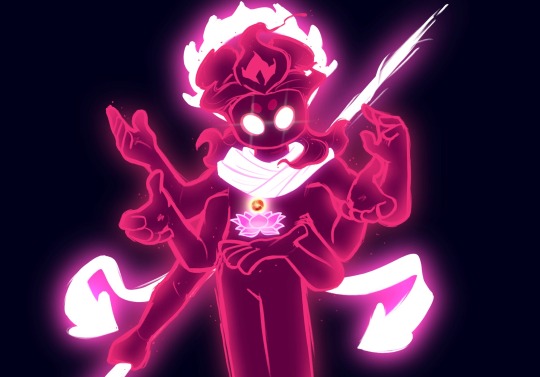
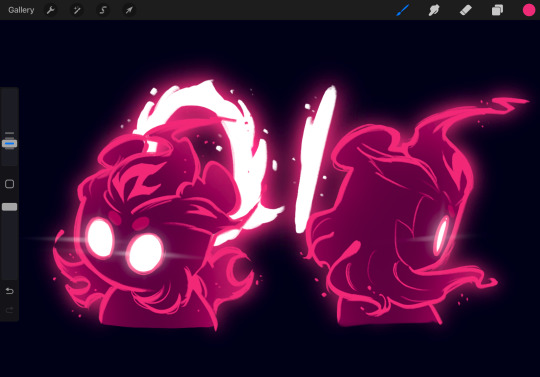
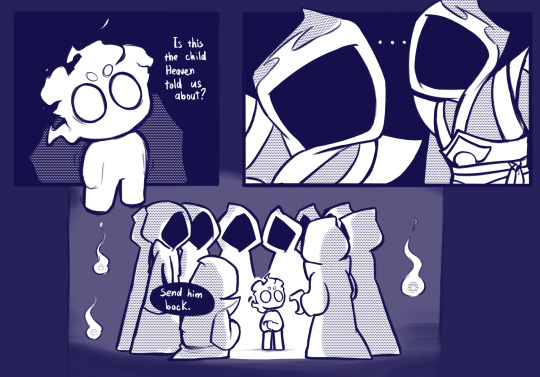
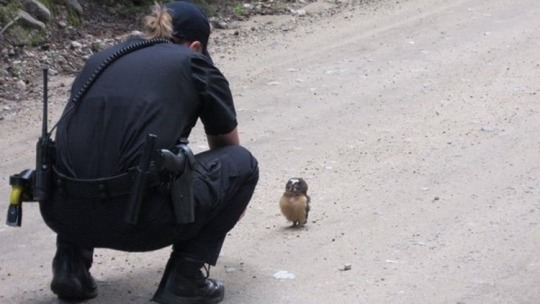
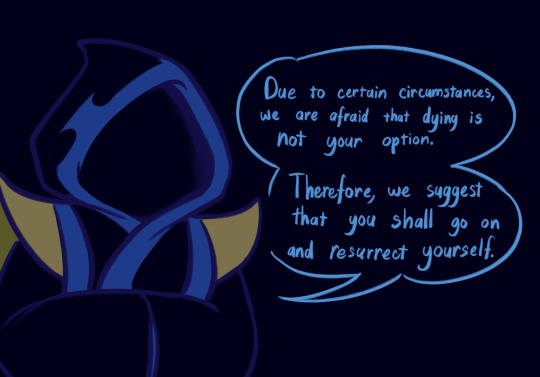
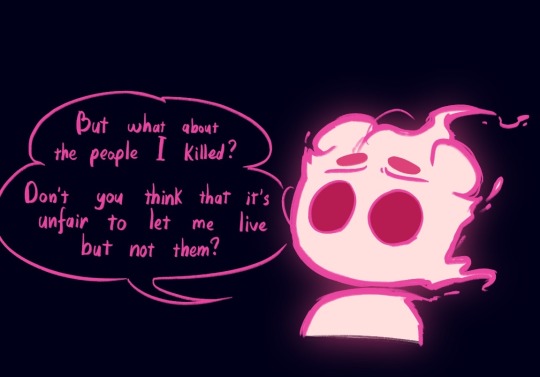
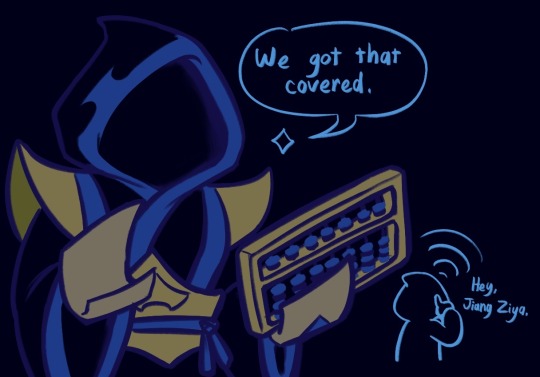

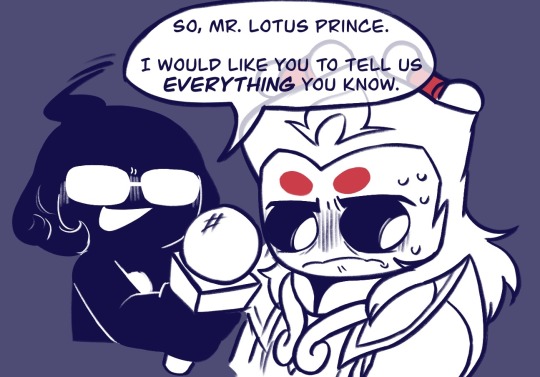
More Qiankun Halo 💫
Nezha knows Wukong better than Macaque, which is why he hold no grudges against him when he messed up and I’m all ears for their early brotherly dynamics
I know Nezha didn’t go to Hell when he killed himself but it would be funny if he did in lmk
#my art#comic#shitpost#nezha#lego monkie kid#lmk#lego#monkie kid#third lotus prince#diyu#ten kings of underworld#ten kings of hell#I made his neck unattached to his body while being a soul because that’s how he died :)
2K notes
·
View notes
Text













SO I thought that this plot of Sun Wukong going back down to diyu to help a soul back to his body and in spite of the protests of hell's highest authority in King Yama was pretty neat for a number of reasons, but the biggest one is that I recently learned Buddhist thought contains figures that could be called "helpers in hell." The most prominent ones are certain bodhisattvas who have taken vows to release all beings from the ultimately illusory hells through helping condemned souls realize that everything they are experiencing--including hell--is a manifestation of their own mind, and that they are therefore free. What's really interesting about this is that these bodhisattvas, as they are placed in contrast to hell's obsessively efficient and bureaucratic system, seem to be thought of as divine lawbreakers who understand hell's system as a mirage, are therefore not bound to its rules, and can as such lead others to happiness and enlightenment by showing them how to break hell's laws as well. And honestly when it comes to divine rule-breakers it does definitely feel like the Buddha Victorious in Strife would do very well in such a role!
#xiyouji#journey to the west#jttw#sun wukong#monkey king#king yama#diyu#buddhism#bodhisattva#jttw retellings#jttw 1986
59 notes
·
View notes
Text
🩷Diyu, Anon of Lust🩷

3 notes
·
View notes
Text
Last week we talked about the 10 Kings of the Underworld, so how about we look at some of the lower-ranking spirits and deities that populate the afterlife, shall we?
First up, the Chinese grim reaper, or rather reapers as there are two of them. Collectively called the Heibai Wuchang and individually Hei Wuchang and Wei Wuchang, these guys are responsible for what's essentially clean up duty. They go and find wandering souls that haven't passed on and bring them to the Diyu. I guess that means if you see a ghost they've been slacking off, huh? Hei, literally meaning black, wears all black robes and carries handcuffs with a nasty scowl on his face. Bai, which means white, naturally wears white clothes and had an umbrella and a smile. Seeing them is bad luck, as they have exactly one job to do: take you to the underworld.
Next are the pair that you'll see guarding the gates, Niutou (ox head) and Mamian (horse face). Well don't they sound handsome? Originally independent deities in their own right, they got reincarnated into human form (reluctantly, in Niutou's case). They end up as friends that take the official exam in the capital, but while Niutou is a hard worker Mamian is a hard schmoozer and passes by sucking up. Niutou is so pissed he full on beats Mamian to death.... and then drops dead himself from exhaustion from all the way too much studying he'd done. When they get to the Diyu and face King Yama, Niutou furiously argues what a lazy kiss ass Mamian is for a whole day. Yama is convinced.... until Mamian speaks up in his own defense and charms the king of the underworld into not punishing him. 110% DONE with this, Niutou breaks out of hell and goes straight to the Jade Emperor. The song and dance repeats, and the Jade Emperor commands them to become guardians of the gates of the underworld. Yama is reasonably worried they might duke it out again, though, so he has them drink this special forget-things soup. They made nice, and are still standing guard to this day.
Lastly we're gonna talk about this magic soup, or rather the nice old lady who makes it. Her name is Mengpo and she has a very important role to play in the cycle of reincarnation. Before crossing the river out of the underworld every soul has to drink a bowl of her special soup that makes you forget everything before you get reborn. However, as I said she's a nice old lady who will sometimes cut people (specifically lovers) a break and give them watered down soup so they can find each other in the next life. She can also sometimes make a bad batch of soup that doesn't work as well (she's old, give her a break).
Honestly I think it's really cute how thoe last person you see on your way out of the diyu is this cute old grandma who gives you a warm bowl of soup and a pat on the back. Isn't that just the most wholesome thing you've ever heard about the underworld?
#mythology sh*tposting#chinese mythology#diyu#king yama#king enma#king yan#heibai wuchang#mengpo#niutou and mamian#niutou#mamian#the underworld#chinese underworld#lmk#lego monkie kid
14 notes
·
View notes
Text
Ok, so, just watched the season 4 specials, and wow that is a ride.
I'm not going to spoil what happened, but I want to talk about something at the end that i believe links into who the next "big bad guy"(s) is/are.
So, potential spoiler warning, go watch the specials and come back here once your done!
What I am referring to specifically is this image and something Wukong said.
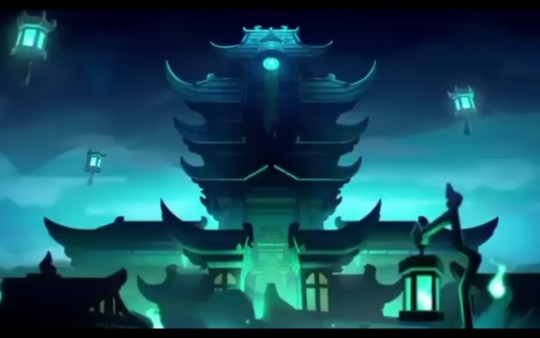
Now, lets get down to business.
During the final confrentation Wukong said something to Azure that could only mean one thing to me. He basically implied he killed Azure back in the past.
But, if that was the case, there is no way Azure should be top side. And unlike my belief that Wukong didn't kill Mac, in this case, I have to believe Wukong killed Azure. Wukong's confusion and questions along with Azure's own recognition that something is wrong and that he was used can only point to the lion's death.
But if that is the case, how was he top side? How did he escape the Diyu?
This will not surprise anyone who has read the journey to the west, the source material for a lot of the Lego Monke Kid past and characters, but, only one person ever went into the Diern and escaped back to the mortal coils. And that was the Monkey King, as shown in Mac's explanation of Wukong's past.

And this vissage looks strikingly familiar to the temple we see at the end, to the point it has to be the same place. Plus some of the individuals who were in the scene were interacting with more pieces of the scroll that was used, specifically referring to it as the "scroll of memories".
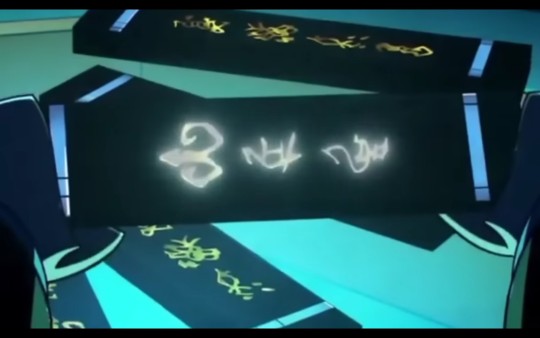
The backstory imagery, Wukongs statement of Azure being dead, as well as this scene linking the scroll back to this place can only point to one thing for me.
The Diyu's 10 kings are the next bad guy.
That place can only be the Diyu, the image is shown when Mac is referring to Wukong's travels into the realm of the dead and removing his name from the leger. And with Azure being dead and the scroll seemingly being the property of the Diyu, and the Diyu being damb spiteful about keeping it's souls in the land of the dead unless they reincarnate there is no way of any of this happening unless the 10 kings set this up. They let Azure out of the Diyu with the scroll in hopes of achieving something.
And based on Azure's almost continuous hate and desire to kill Wukong till Wukong pointed out the problem the only reason I can think they would do it is exactly that they wanted Azure to kill Wukong.
It makes sense after all, the 10 kings were humiliated by Wukong in the original story and they likely would have wanted to get back at Wukong. But why now? Why over likely 1000 years later? Well, part of it likely relates to Wukong trashing the place and it taking them time to get the place back in order. The other reason, I think, relates to them thinking Wukong would be weak enough for Azure to take him down. We all remember how beat up and drained Wukong was for all of season 3, and while time had likely passed between seasons 3 and 4 it probably wasn't a lot of time. So, maybe once the 10 kings got word of what happened they searched for a soul to use to achieve their goal, kill Sun Wukong.
I don't think they expected their plan to go so far off the rails and almost destroy the universe, but I am positive they wanted Wukong dead.
So, I expect season 5 will either be the group having to protect Wukong from even more of his old enemies trying to kill/kidnap him, or having to rescue Wukong again, this time from the Diyu.
I can't be sure though, and if this all is the case that they were trying to kill Wukong, it is entirely possible my believe Wukong didn't kill Mac is wrong and the Diyu was trying to use LBD to get rid of Wukong, potentially multiple times and tried to use Mac as a tool to make it happen!
Also, Mac being so tight liped about what happened to fully push apart Mac and Wukong even now, makes me hope we will see it if/when Wukong and Mac finally fully apologise to each other and start rebuilding their relationship. What wukong did with Mac in the ending scene makes me think Wukong wants to try the two's friendship again, but I can't be sure.
However, I need to ask, what do you all think?
Comment below your thoughts.
#lego monkie kid#lmk sun wukong#sun wokung#Diyu#death mention tw#lmk macaque#lmk azure lion#my theories#Spoilers
27 notes
·
View notes
Text
Crazy theory regarding the Traitor of the Ten Kings
Okay guys! Hear me out on this! I may have this interesting theory after connecting the dots when doing a little bit of research regarding the ten kings and diyu-BUT THE BIG ONE IS on the kings. I THINK I may have an idea of who could be the traitor amongst the kings, who released Azure and planted that scroll-WHO MAY have set off the chain of events dating back to when the Demon Bull King escaped the underworld (WHICH WE still need to know HOW he escaped), Lady Bone Demon and the recent events.The traitor could be Yan Luo Wang! He was once the FIRST Ruler of Diyu, but was demoted to 5th court due to being merciful to souls. HIs position was given to Qin Guang Wang.SO!
What if Yan Luo Wang wanted to get revenge on the court for the demotion by releasing Demon Bull King from the Underworld, who may have released Azure from the scroll, and might have had a hand in LADY Bone Demon's return-course, some people believe it could be the Mayor as a culprit since recent evidence shown he didn't appear UNTIL after Calabash (Don't know how the bros trapped him, but maybe they were told to trap him to keep him from causing trouble-Don't know on that one).Perhaps the fifth king is in cahoots with the Not-Mayor or the fifth king is pulling the strings and is trying to cause chaos in all the realms for the demotion and to give a clean slate.
Think about it:
Lady Bone Demon: Erase Wukong's name and give the universe a clean slate
Azure: Wanted to bring peace and balance so nobody suffered, but Wukong got in the way and had to be destroyed.
Demon Bull King: Unknown when he was released from the underworld, but he wanted to be the most powerful when he was absorbing Lady Bone Demon's power when she was just bones and wanted the staff. (Involvement-unknown)
It's just a theory-but the big question is why the FIFTH KING wants to make chaos or if he is trying to show he can be merciless by trying to do what the other kings couldn't do: KILL WUKONG once and for all. So he decided to use puppets for his plan.The fifth king could be the traitor.
#diyu#lmk#lego monkie kid#ten kings#legomonkiekid#monkiekid#monkie kid#theory#discussion#flying bark productions#traitor#yama king#yama#chinese mythology#lady bone demon#wukong#demon bull king#azure lion
30 notes
·
View notes
Text
Three
Heaven’s music in child’s laughter
Hell’s darkness in brothers slaughter
And in the dirt
consumed by all the night of the cosmos
Death speaks.
And says to Her
“show them the meaning of sight”
And so She did.
But the poison is seeping through.
And the balance has begun to rot.
Walking eternity.
A passing wraith.
Judgment higher
Than any faith.
#descriptive words#DiYu#storytelling#story writing#death#heaven#hell#poetry#poems and quotes#my poem
5 notes
·
View notes
Text
🖤🎶 ALBUMS FOR SPECIFIC MOODS:
nostalgia, growing up toooooo fast, appreciating what was, bad habits (my personal fave)
evil, ominous, hard choices, facing consequences, reluctant acceptance of fate, based on the concept of “Diyu”
evolution, creativity, drunk and thoughtful, the days are only different if you make them be
a bit of a mix of 1 and 3, the bridge between, rough endings and confident beginnings, new eras, controversial confusion
fuck it all, life in the fast car, smoke it away, introspective analysis, deeeep reflection of self
let me know what you think! and if you have additional or opposing emotions for each album!! this is my favorite artist so i’m alwayssss down to discuss 🖤🖤
#music recs#loveyouhaiku#indie music#tdf music#baby blue#diyu#pls listen#i love him#life altering albums#new music#new album#creative music#creative minds#samples#talented artist#new artist#art recommendations#art#heart wrenching#chill music#chill vibes#soundcloud
0 notes
Text
Review: The Spindle of Fate by Aimee Lim
The Spindle of FateAimee LimFeiwel & FriendsPublished June 4, 2024 Amazon | Bookshop | Goodreads About The Spindle of Fate When Evie Mei discovers that her recently passed mother was the head of a guild of magical weavers, she enters the Chinese netherworld to try and bring her back in this middle-grade debut. Twelve-year-old Evie Mei Huang never did like helping in her mom’s tailor shop. She…

View On WordPress
0 notes
Text






























So there's this gigantic scroll of the Buddhist Naraka in the classical style of hell panorama art that was popular in the far east, and a couple years back I posted a big cut up of these images that I had tried to stitch together across a few different versions --some very noticeably lower quality scans or photographs and image resolutions than others. But at the time I had been missing a few sizable chunks, as a lot of the images I'd found online were incomplete collections and photographs and cropped to focus on specific scenes, leaving certain transitional segments of the illustration missing. Well I did at some point track down the missing bits, even if they didn't all stitch into the bigger picture all that cleanly.
unfortunately it's too damn big to post as one image, and by posting it in a format that can be scrolled through contiguously, you actually have to start from the end and go backwards to the front. So starting from the left side of the first image you can see the tortured souls having paid their dues to the karmic cycle being reborn into the material world as babies and as animals. And at the right side of the final image you'll see the world of the living being looked down upon by the divine as the newly dead shuffle into queue to be judged by the first of several kings/judges of the underworld
#i dunno what to tag this that would make any actual sense#from like a functional stadnpoint...#naraka#buddhist#buddhism#diyu#chinese art#are those things people are searching for?#hell#underworld#afterlife
1 note
·
View note
Note
mod, to lendo as regras e fiquei numa duvida, eu posso usar aql bot no discord para fazer o perfil da minha personagem ou tenho que mudar msm minha conta para a personagem?
Oi, non!
Não precisa necessariamente de bot, é possível clicar no servidor e trocar seu apelido só lá, mas fique à vontade se quiser usar outra ferramenta também!

0 notes
Text
So I was like, halfway through writing my own post about the 10 Kings when I found this post from a nerd after my own heart, which is objectively better and more informative, so instead of just doing This but Worse or This but Plagarized, I'm just gonna reblog it.
The Ten Kings of Hell: a history
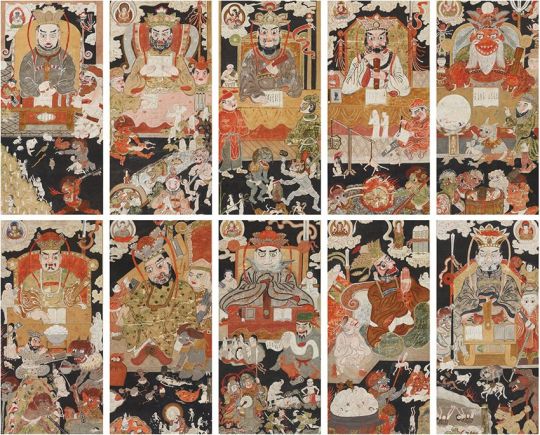
The main judge of the dead in many schools of Buddhism, known as Enma Daiō in Japan and Yanluo Wang in China is a well known figure, in no small part thanks to numerous popculture adaptations. However, the exact history behind Yama, a Hindu deity, transforming into a Chinese bureaucrat, as well as the identities of Enma’s subordinate kings of hell and lesser courtiers are relatively obscure. Under the cut I will discuss the development of the idea of ten kings of hell, the history of Enma himself (and why in theory you could say there’s two of him), as well as a number of associated figures. Read on if you want to find out which mythical figure the historical Buddha was purportedly disappointed with, how popular imagination turned a completely mundane government official into Yanluo’s human guise centuries after his death, and much more.
Keep reading
88 notes
·
View notes
Quote
Woven by hand, it takes hours, if not days or even months to make.
Lucy Dan ([IG, Medium, TWT]: @ramyeonjpg)
0 notes
Text
TONIGHT, WE DINE IN HELL!!!
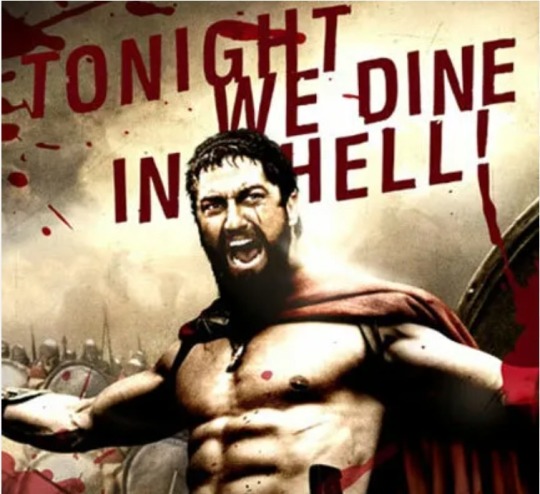
But seriously, we're taking about the underworld today.
The Chinese, Japanese, and Korean underworlds are very similar as they all draw upon the same Buddhist ideas. King Yama also shows up in JttW, when Wukong id kidnapped to the underworld (called the diyu in Chinese) and removes his name from the ledgers of the dead. For those who want a closer look at the Japanese underworld, Jigoku, I highly recommend Hozuki no Retetsu, an anime about an oni beauracrat as its both informative and hilarious. For those that don't feel like it or need a refresher, here's the quick and dirty.
The underworld is ruled by 10 Kings, with one of them being the big guy in charge. He has a few names: King Yan, King Yama, and King Enma being a few. Sometimes the word 'great' is added to the start of his name to signify that he's the head honcho. You may know him as the big red guy from Dragon Ball who checks in the dead, or the father of Koenma from Yu Yu Hakusho. He also shows up with his pesse in season 4 of Lego Monkie Kid (they're the shady guys that stand in a circle menacingly), though he isn't named. He's not that hard to find, really.
The other 9 kings, in comparison, are less common, which is a shame. See, each of the 10 kings has an important role to play when judging a soul, weeding out all but the worst of the worst for the 10th king. King Yama help the 5th trial, right in the middle. The first king is basically there to sort out all the really good people. If you're such a good person that you don't have that many sins to be judged, he can give you the fast pass to reincarnation. If you do have a lot of sins, though (which, let's be honest, is most of us), you keep moving through the courts as the different kings weigh your sins according to their specialty.
The hearings for each soul happen 7 days after death, with each subsequent trial being held 7 days after the last for the first 7 trials. The 8th trial occurs 100 days after death, the 9th after a year, and the 10th and final trial is held after 3 years. During each trial, the king in charge will take into account any prayers or offerings given in the deceased person's honor to possibly lighten the sentence, so proper funerary rights on these specific dates are very important. After all the trials are done and you've been punished according to your sins, you are finally allowed to reincarnate.
I really tried to get more information on each specific king, but there isn't much I could find in English. If anyone knows more, please tell me! I'm so curious!!!
Sh*tpost Masterlist
#mythology sh*tposting#chinese mythology#lmk#sun wukong#journey to the west#mythology#jttw#king yama#king enma#king yan#the underworld#diyu#jigoku#the 10 kings#buddhist beliefs#lego monkie kid
14 notes
·
View notes
Text
Fengdu Ghost City
The Fengdu Ghost City in China is steeped with the paranormal and cultural afterlife as well as being a big tourist attraction. Check out how the afterlife could end up after your death for the cost of a ticked.
The Fengdu Ghost City in China is steeped with the paranormal and cultural afterlife as well as being a big tourist attraction. Check out how the afterlife could end up after your death for the cost of a ticked. In the Chongqing region in China, at the lean for the Tibetan Plateau and along the Yangtze river. Far from the sea, at the heart of the country, the city for the dead is built: Fengdu…

View On WordPress
#2000#afterlife#article#asia#buddhism#china#chongqing#Dark Tourism#diyu#featured#fengdu ghost city#haunted city#haunted mountain#hell#journey to the west#ming mountain#necropolis#paranormal#taoism#torture#tourism#travel#underworld#yangtze
1 note
·
View note